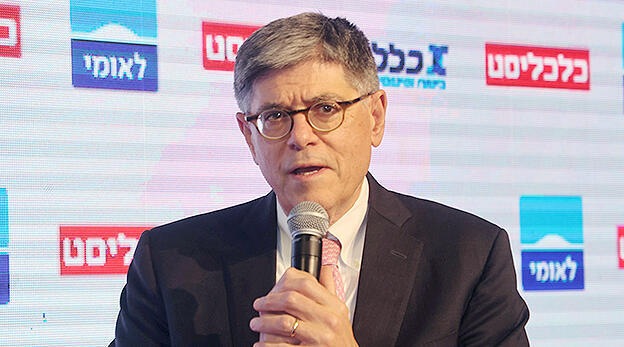
High-tech companies have already withdrawn $780 million from Israel as judicial coup fears mount
High-tech companies have already withdrawn $780 million from Israel as judicial coup fears mount
An examination of dozens of public and private high-tech companies, whose aggregate value is $40 billion, also suggests that they are refraining from transferring a total amount reaching $2.2 billion into the country
Much of the attention over recent weeks has been focused on protest announcements by venture capitalists and entrepreneurs such as Eynat Guez from Papaya and Assaf Rappaport from Wiz, who both announced that they will transfer company money out of Israel. However, behind the scenes the situation is much more dangerous and is developing quietly but quickly. An investigation by Calcalist shows that a large number of high-tech companies, whose managers are not at all involved in the protest against the judicial coup, are quietly withdrawing their companies' cash balances from Israel.
An examination of dozens of public high-tech companies, unicorns and startups shows that as of last Friday, 37 companies decided to withdraw $780 million from bank accounts in Israel and transfer the money to banks abroad. In addition, a decision was made to stop transfers to Israel of an aggregate amount of $2.2 billion generated from activities abroad - whereas until today, funds such as these were flowing into the country.
The companies are all from different fields, in different stages of activity, and some of them are managed by people who identify themselves as right-wing. Together, they employ 8,000 employees in Israel, their aggregate value is $40 billion, and they have raised an aggregate amount of $9.3 billion to date. The decision to transfer at least half of their cash balances abroad was made due to the demands of their investors (in private companies), or due to the guidance of their CFOs (in public companies), and as a result of the risk analysis by their risk committees.
"No one abroad is delving into articles and analyzes what is happening in Israel, the only thing that interests anyone is stability and sentiment, and right now, in Israel, there is instability and the sentiment is negative," said a founder and CEO of one of Israel's largest high-tech companies in the medical field. "As far as I'm concerned, withdrawing the money is the most responsible and moderate move possible - towards my company and also towards the Israeli government and economy. It's a reversible move, unlike the removal of intellectual property from Israel and the de facto transfer of a company abroad. This country is important to me, I came back here after several years abroad, my son is serving in a combat unit, I am not being forced to stay. But, right now I have no choice with our investors. My job as CEO is to fight against the competition, not fight for democracy."
In most cases, the withdrawal of funds amounts to tens of millions of dollars. For example, a cyber company with a valuation of over $2 billion decided to withdraw $110 million from Israel. Another cyber company, valued at over $2.5 billion, withdrew $45 million. A fintech company with a valuation of over $4 billion transferred $65 million. A software company with a valuation of over $3 billion will transfer $130 million from accounts in Israel in the coming weeks. It is safe to assume that there are other companies, whose details did not reach Calcalist, that are intending to withdraw at least some of their cash from Israel.
"The withdrawals began a week and a half ago. It is a quiet flow by companies taking non-protest actions and they do not want to be exposed," the founder and CEO of an Israeli high-tech company traded on Nasdaq told Calcalist. "We are doing this only out of risk management. There are many global companies here, from the point of view of their investors, it was never fully clear why it was important to keep the money in Israel. But now, those investors are telling us that this is an exposure to unnecessary risk and are demanding that we keep at least half of our cash balances abroad."
These words are a direct continuation to what Kobi Marenko, co-founder and CEO of Arbe Robotics, told Calcalist last week, when he stated that every responsible manager should keep half of their company's cash abroad.
"I am telling all the CEOs of companies where I serve as chairman or as a board member, that as management they are obligated to their shareholders to get their funds out of here," Ori Hadomi, who previously headed Mazor Robotics, which was sold to Medtronic for $1.6 billion, told Calcalist. "My recommendation has nothing to do with what investment banks have to say, rather with my understanding that I cannot guarantee any shareholder that in the future they will have access to funds that will be held in Israel." According to Hadomi, who is still responsible for managing collaborations and strategic initiatives at Medtronic, "there will be changes here and I foresee scenarios where the state will easily decide that it wants to get its hands on investors' money. It should not be taken for granted that things will continue as they were, and whoever thinks so is delusional. Unfortunately, this apocalyptic vision is becoming a reality much faster than I thought."
Some 80% of the money financing high-tech startups comes from abroad and companies usually hold a large part of their cash balances in dollar and shekel deposits in Israel. This was not only due to purely patriotic considerations, but also from a purely economic consideration: the shekel was strong on the one hand and strengthened against the dollar and the Euro over the past few years, and, at the same time, the interest rate on a dollar deposit in Israel is more than one percent higher than the interest rate on a similar deposit in the United States. For example, a three-month dollar deposit in an American bank today yields 4.3%, while in Israel you can also get 5.3% on the same deposit. This is a significant gap, especially for an unprofitable company whose cash balances sometimes reach hundreds of millions of dollars. The companies explained to Calcalist that the withdrawals are not made in one day but gradually, and only when each deposit has vested, since it is not possible to exit a dollar deposit before the end of the agreed period.
In addition to the active extraction of funds, company directors explained that they will not transfer funds to Israel in the near future. Money generated by the companies' current activities will remain abroad instead of mostly entering Israel, either being converted into shekels and being deposited in dollars in local banks. The impact, which currently amounts to about $2.2 billion, could be even more dramatic in terms of the local banks and the exchange rate of the shekel against the dollar.
According to Rona Segev, partner in the venture capital fund TLV Partners, non-Israeli investors in startups are demanding that money won't be transferred to Israel at this stage. "In recent years, especially in the past five years when the shekel was very strong, startups converted a year's worth of money in advance from dollars to shekels and kept it here. Now the board of directors' decision is to wait, with the understanding that the shekel is going to weaken further. Therefore, the plan is to transfer only the amounts which are needed to pay salaries, on a monthly basis.
"This is done quietly, behind the scenes, and has nothing to do with the high-tech protest. The considerations are not political, it is risk management. In the last five years, there was very high confidence in the shekel, and now that is changing. We need to not only look at the money being withdrawn, but also the money that won't be coming in," added Segev.
Because of the gradual process, the banks may not yet be able to put their finger on what is occuring, although the managers of all the companies that spoke with Calcalist testify to stressful phone calls from banks with every instruction to transfer funds to a foreign bank. But what illustrates the process in the best and most bleak way for Israel is the weakening of the shekel against the dollar over the past two weeks.
Last Friday, the dollar jumped by 0.7% and its rate reached 3.54 NIS. This is a 2% increase in just one week. The current level is very close to the annual high of 3.55 NIS per dollar. In December-January the shekel strengthened again and was already at the level of 3.4 shekels to the dollar.
The dollar has been strengthening in the last two weeks against the shekel, contrary to the general trend which has actually seen the dollar weaken against the other currencies recently, which once again clearly signals that the problem is with the shekel.














